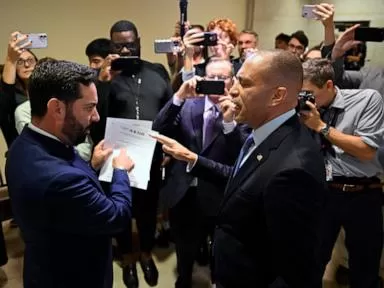Capitol Crossroads: Why Trust Crumbles and Dysfunction Lingers in Washington
Share- Nishadil
- October 09, 2025
- 0 Comments
- 2 minutes read
- 40 Views

The Crisis of Trust: Why Lawmakers Struggle to Govern in Washington
A deep dive into the pervasive lack of trust and escalating dysfunction among U.S. lawmakers, which continues to make effective governance and compromise increasingly difficult in Washington, leading to continuous political stalemates.
Washington D.C. is a city perpetually teetering on the edge of a political precipice, where legislative gridlock isn't an anomaly, but a deeply ingrained habit. The recent, all-too-familiar scramble to avert a government shutdown – a drama that plays out with alarming regularity – serves as a stark reminder of a more profound crisis: a devastating lack of trust among lawmakers.
This isn't just about partisan squabbles; it's about a fundamental breakdown in the ability to negotiate, compromise, and ultimately, govern.
Multiple high-ranking members of Congress, from both sides of the aisle, are openly voicing their exasperation. The sentiment is palpable: the current political environment is toxic, characterized by deep-seated suspicion and an unwillingness to engage constructively.
One long-serving senator lamented the absence of genuine relationships, recalling a time when spirited debates were followed by collegial dinners, fostering a foundation of mutual respect that is now largely absent. Today, policy disagreements are often viewed through the lens of personal attacks and electoral advantage, rather than a genuine effort to solve national problems.
The consequences of this erosion of trust are far-reaching.
Critical legislation, from annual budgets to infrastructure projects and foreign aid, becomes mired in endless procedural hurdles and brinkmanship. Each legislative battle is treated as an existential fight, leaving little room for the give-and-take essential to a functioning democracy. This creates a perpetual state of uncertainty, impacting everything from federal services to international standing.
It's a self-perpetuating cycle: mistrust leads to gridlock, which then further entrenches the mistrust.
Several factors contribute to this predicament. The 24/7 news cycle and social media amplify partisan rhetoric, turning every disagreement into a public spectacle. The rise of ideological purity tests within both parties makes compromise seem like a betrayal.
And the increasing focus on fundraising and re-election campaigns often prioritizes political posturing over substantive policy work. Lawmakers spend less time genuinely debating and more time strategizing how to score political points against their opponents.
Finding a path forward requires more than just a change in leadership; it demands a cultural shift.
Rebuilding trust will necessitate a concerted effort to foster dialogue, encourage bipartisanship, and prioritize the common good over narrow partisan interests. This means investing in relationships, seeking common ground, and perhaps, most importantly, remembering that despite their differences, all lawmakers ultimately share a responsibility to serve the American people.
Until then, Washington seems destined to continue its dance on the edge, leaving many wondering if the music of dysfunction will ever fade.
.Disclaimer: This article was generated in part using artificial intelligence and may contain errors or omissions. The content is provided for informational purposes only and does not constitute professional advice. We makes no representations or warranties regarding its accuracy, completeness, or reliability. Readers are advised to verify the information independently before relying on







